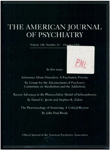Role of gamma-aminobutyric acid in antipanic drug efficacy
Abstract
All effective pharmacologic agents used to treat panic disorder augment gamma-aminobutyric acid (GABA) transmission. Anxiolytics and antidepressants that lack GABA activity are not effective in panic disorder. To test the hypothesis that GABA activity is a component of antipanic drug efficacy, the authors treated nine medication-free panic disorder subjects with oral baclofen (30 mg/day for 4 weeks) in a double-blind, placebo-controlled crossover trial. Baclofen, a selective GABA agonist, was significantly more effective than placebo in reducing the number of panic attacks and scores on the Hamilton anxiety scale, Zung scale, and Katz-R nervousness subscale. The authors discuss possible mechanisms of antipanic drug efficacy.
Access content
To read the fulltext, please use one of the options below to sign in or purchase access.- Personal login
- Institutional Login
- Sign in via OpenAthens
- Register for access
-
Please login/register if you wish to pair your device and check access availability.
Not a subscriber?
PsychiatryOnline subscription options offer access to the DSM-5 library, books, journals, CME, and patient resources. This all-in-one virtual library provides psychiatrists and mental health professionals with key resources for diagnosis, treatment, research, and professional development.
Need more help? PsychiatryOnline Customer Service may be reached by emailing [email protected] or by calling 800-368-5777 (in the U.S.) or 703-907-7322 (outside the U.S.).



